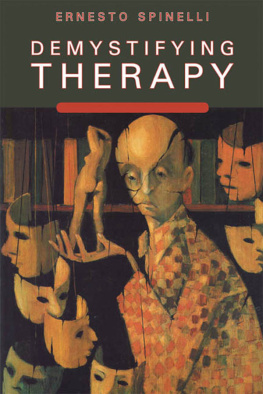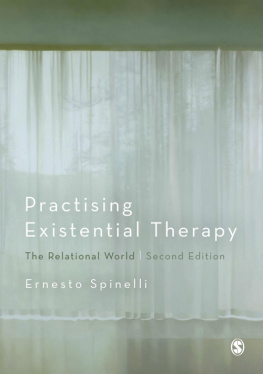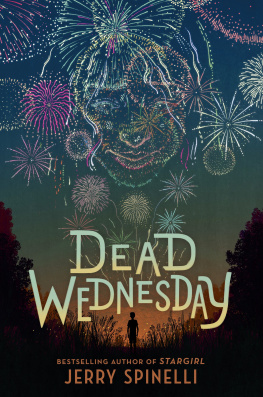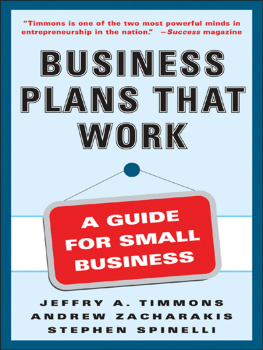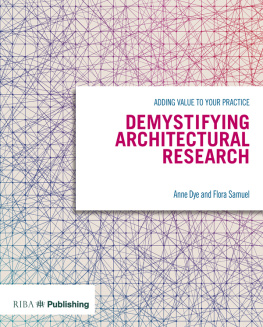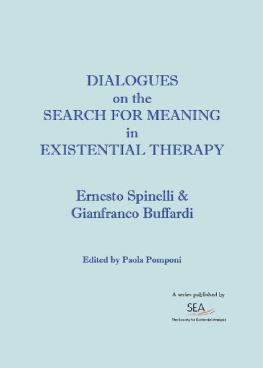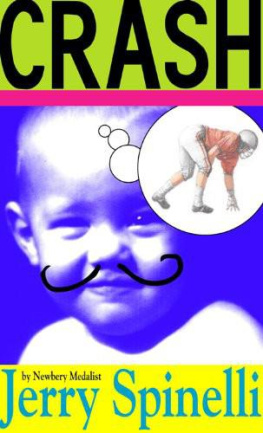DEMYSTIFYING
THERAPY
Praise for Ernesto Spinellis Demystifying Therapy
this is a brilliant book, which I unreservedly recommend to anyone in the counselling field It will most surely provoke fertile, enlightening and constructive engagement within our profession for years to come.
Richard House, Counselling
[Ernesto Spinellis] argument is that theory-led approaches tend to reinforce the mystique of therapy and increase the likelihood of therapists misusing their power and of clients having a negative experience of therapy. As an alternative, he puts forward an existential-phenomenological model of therapy, which requires that the therapist attempts to bracket out his or her biases, assumptions, and so on and try to enter the patients own meaning world in order to enhance their self-clarification, challenging the person, as it were, from within.
Dr S J Ticktin, Newsletter of the GP Psychotherapy Association of Ontario
Spinelli thinks therapists are in philosophical terms too nave and do not examine their models critically enough. Instead they focus on techniques, and influence their clients in ways of which they are unaware. He believes that being with the client in relationship is philosophically the most moral, the safest and, in fact, the only justification for therapy He implies that self-awareness, humility and a critical approach are fundamental to working in any therapeutic model. Perhaps some work on philosophy should be part of all therapy trainings, so that self-awareness and self-monitoring could be achieved at a greater depth of understanding.
Courtenay Young, Self and Society
[ Demystifying Therapy ] is a book that raises many questions which merit extensive discussion. I hope it will receive it. The author has the gift to lend even the most elusive elements of his argument a transparency which opens it up for understanding and critique.
Hans W Cohn, Journal of the Society for Existential Analysis
Dr Spinelli has written an extremely thought-provoking and enlightening analysis of the dangers inherent in most of the current therapies.
His primary concern is the potential that exists for client abuse, not just sexual or emotional maltreatment but, more importantly, misuse of the power a therapist has within the therapeutic encounter.
Spinelli eruditely elaborates on the importance of the therapeutic relationship and how working within a descriptively focused encounter can help ensure that interpretations are made within the clients own experience and not imposed from outside.
Alison Strasser, Psychotherapy in Australia
DEMYSTIFYING
THERAPY
ERNESTO SPINELLI
Other works by Ernesto Spinelli
published by PCCS Books
Tales of Un-knowing
Therapeutic encounters from an existential perspective
ISBN 978 1898059 79 0
Republished in 2006 by
PCCS Books
Wyastone Business Park
Wyastone Leys
Monmouth
NP25 3SR
UK
Tel +44 (0)1600 891509
www.pccs-books.co.uk
First published in Great Britain 1994
by Constable and Company Ltd
Ernesto Spinelli, 1994
The right of Ernesto Spinelli to be identified as the author of this work has been asserted by
him in accordance with the Copyright, Designs and Patents Act 1988
All rights reserved.
Apart from any fair dealing for the purposes of research or private study, or criticism or review, as permitted under the Copyright, Designs and Patents Act, 1988, this publication may be reproduced, stored or transmitted in any form, or by any means, only with the prior permission in writing of the publishers, or in the case of reprographic reproduction, in accordance with the terms of licences issued by the Copyright Licensing Agency. Enquiries concerning reproduction outside those terms should be sent to the publishers.
Demystifying Therapy
A CIP catalogue record for this book is available from the British Library
ISBN 978 1898059 89 9
eISBN 978 1910919 12 5
Cover The Psychologist by Zoltn Gbor (Private collection)
CONTENTS
For my father
Who thinks that therapy is a load of nonsense,
For my mother
Who takes the opposite point of view,
And for my students and clients
Who have had to put up with the divided loyalties
Of yet one more dutiful son.
Professor Ernesto Spinelli, PhD is a Fellow of both the British Psychological Society (BPS) and the British Association for Counselling and Psychotherapy (BACP) as well as a UKCP registered existential psychotherapist. In 1999 he was awarded a Personal Chair as Professor of Psychotherapy, Counselling and Counselling Psychology. His authorship of numerous specialist articles and several highly respected and widely read books dealing with the theory and practice of existential psychotherapy has earned for Ernesto a BPS Counselling Psychology Division Award for Outstanding Contributions to the Advancement of the Profession, and an international reputation as a leading figure in the advancement of contemporary existential psychotherapy. As well as maintaining a private practice as a psychotherapist, executive coach and supervisor, Ernesto is Director of Ernesto Spinelli Associates (ESA).
INTRODUCTION
Were playing those mind games together
John Lennon
Try to imagine a world where psychotherapy or counselling do not exist. Imagine that not only are there no more private practices for those who can afford to pay specialists to listen to and assist them in dealing with their problems, nor are there any similar services provided by local authorities, community groups and educational or religious establishments, but also that there are no longer any telephone help-lines such as the Samaritans, Childline, and so forth, nor are there any problem pages in your newspaper or magazine, nor any radio station agony aunts and uncles, nor any self-help books, or pop psychology manuals, to help you cope with stress or sexual problem or to teach you to live more suitable or hedonistic or caring or fulfilling lifestyles. And consider, as well, how much less psychobabble there would be for morning television hosts to endlessly chat on about or to find ways of having you reveal, live, on the air, the various concerns and dilemmas you face each day or can no longer live with. Consider as well the nature of the everyday conversations you might engage in with your colleagues, friends, children, spouse or partner, and how much of their content would now be bereft of notions and ideas that would be derived from popular usage of therapeutic terminology. How great would be the gaps in peoples thinking and communicating about themselves and others? How would people cope with the myriad variety of problems that psychotherapists and counsellors (both trained and self-made) are experts in dealing with? How would they even recognize them or discern their existence?
A colleague of mine once pointed out to me that the basic premise of Woody Allens film A Midsummer Nights Sex Comedy lay in its attempt to present a world of social and intimate relations which existed prior to the advent of Freuds psychology and the dramatic, lasting cultural changes it would bring forth. Perhaps it was the very strangeness of this world, and the irksome navet of its characters, which invoked in me, and in a great many others who saw the film, a sense of disgruntlement that made the cinematic experience seem so disappointing. Like Adam and Eve, it would seem, once we have eaten of the tree of knowledge, we can never return to that prior state of innocence. Nor, perhaps, can we fully re-experience it.


